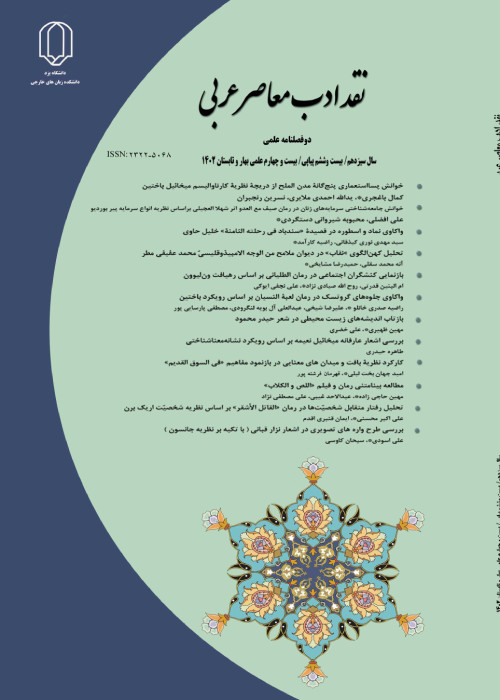A Study of the components of the romantic school in the resistance poetry of Mes'ad Mohammad Ziad
Romanticism, which is a school based on the belief in the value of individual experiences, fantasies, creativity and imagination, sometimes manifests itself in such areas as resistance. In this regard, it has found special position in literary contexts where the ideal are more important than the real. The mind that contains idealistic tendencies offers a kind of action based on conflict with the rational. This school is a Western literary approach that emerged in England and Germany in the late eighteenth century, then in France, Italy, Russia and other European countries in the nineteenth century, and finally dominated the European literature. It is very complex and chaotic and sometimes has contradictory principles. The romantic approach combines nature and art, poetry and prose, memory and prophecy, vague beliefs and vivid emotions, what is heavenly and what is earthly and, finally, life and death. Zarrinkoub says that this school, unlike classicism, which depends on reason, is based on passion, taste, feeling and imagination. The basis of insight and perception of romantics is a personal and individual element, and their ideas are mostly relative. Beauty and art is the superiority of feeling and emotion over other mental powers, emphasizing the unity and harmony of poetry and music, freeing oneself from the shackles and dealing with individual emotions. In the Arabic literature, romantic poets and writers reduced the rule of reason by making their inner feelings dominant through their work. They did it by taking refuge in the skirts of nature, joining the human conscience, and expressing romantic regret and pain within themselves.Romanticism in the Arabic literature was somewhat different from the European romanticism in terms of themes and concepts. Among the expressive features of Arab romantics, one can refer to the avoidance of task and art, trying to use fluent words, relying on music and harmony of words and phrases, and using illustrations based on imagination and emotions. Conceptually. when emotion and imagination dominate, a single spiritual atmosphere overshadows the whole poem, so that the poet, with the dominence of emotions and feelings enriches the pains, suffering. He depicts deprivations and aspirations. Then, by taking refuge in nature, he reduces some of his inner pain and achieves the desired peace. Of course, Mohammad Mandour considers this school to have extreme practices in the mere use of emotional emotions and painful emotional cries. Regarding the romantic view of the Arabic poetry, it should be added that this school sometimes gives a negative and sad spirit and sometimes a positive and thoughtful spirit to the poem, which is a lively and active look at the concepts of freedom and struggle. He has a constant desire for revolution. In the contemporary Arabic literature, as in Palestine, many writers have turned to this style due to environmental disorders and unsuitable socio-political conditions. One of the poets in this field in Palestine is Masad Mohammad Ziad. Like other contemporary poets, he turned to this school of romantic grief and sorrow due to the unhealthy conditions of their environment as well as the Zionist aggression and murders. They turned to this school and expressed their pain and sorrow in this form of poetry. Massad's set of sorrowful poems in Palestine express romantic longing for his pain and suffering and his homeland caused by the turbulent situation in the political, social and economic arenas as well as his constant sense of pain, which he has expressed to his compatriots. The social romanticism in his poetry is more tangible than his individual image.
This research has been done by descriptive-analytical method with reference to library and electronic library resources and thematic-content retrieval, and based on objective observations of the poems in question, and its adaptations to the theoretical foundations of the discussion to examine the effects of this school in Poems about the stability of this poet.
The findings of the study indicate that components such as regret about disorders and pains and inappropriate environmental conditions, reminder of the beloved and childhood, reflection of grief and loneliness, regret of the crimes in the occupying regime, idealism, and freedom from restraints in Mas'ad Ziad's poetic speech are prominent, and thus the poet has been able to convey his grief to the audience in a desirable romantic processing of resistance-oriented themes.
The poet has used linguistic and phonetic tools in some contexts to process his concepts concretely. It also seems that, due to the completely different nature of romantic feelings from revolutionary and resistance-oriented beliefs and spirits, the poet has been able to provide a suitable combination of these two relatively heterogeneous spaces to express his poetic intentions. The prominent aspect of romanticism in his poems is more than social romanticism. In some places, the poet's reliance on society and the entanglement of poetry and his personality with individuals in society and their pains are evident. He is an intellectual cautious with attacks on the Zionist regime and the Jews who have usurped the land of Palestine, and this credible attack, along with categories such as idealism and the reflection of grief and loneliness, is imperceptibly effective. In addition, with his own romantic style, he expresses his inner pain about his homeland, his martyred fellows, missing of his beloved (which is his homeland), his childhood and the happiness and sufferings of the society in the form of poems. He falls and, because of the aggression and disorder of the environment, he looks at an idealistic and imaginary world that is only visible in his mind. He seems to be waiting for the promised savior to bring humanity out from under the boots of oppression and tyranny.
- حق عضویت دریافتی صرف حمایت از نشریات عضو و نگهداری، تکمیل و توسعه مگیران میشود.
- پرداخت حق اشتراک و دانلود مقالات اجازه بازنشر آن در سایر رسانههای چاپی و دیجیتال را به کاربر نمیدهد.



